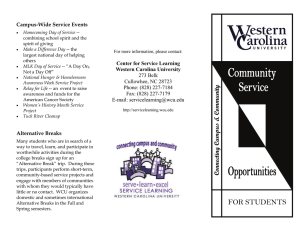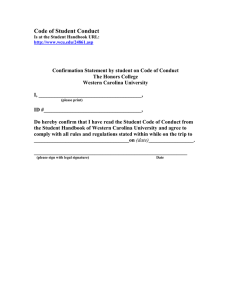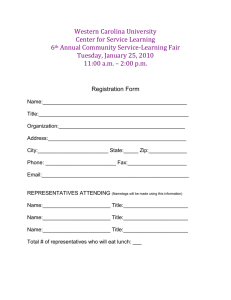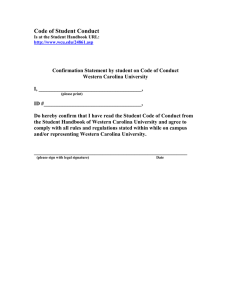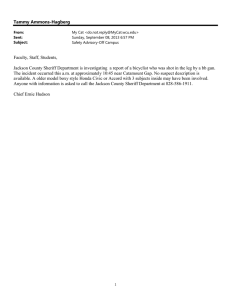SENTINEL T Vol. 4, No. 1 January – March 2006
advertisement
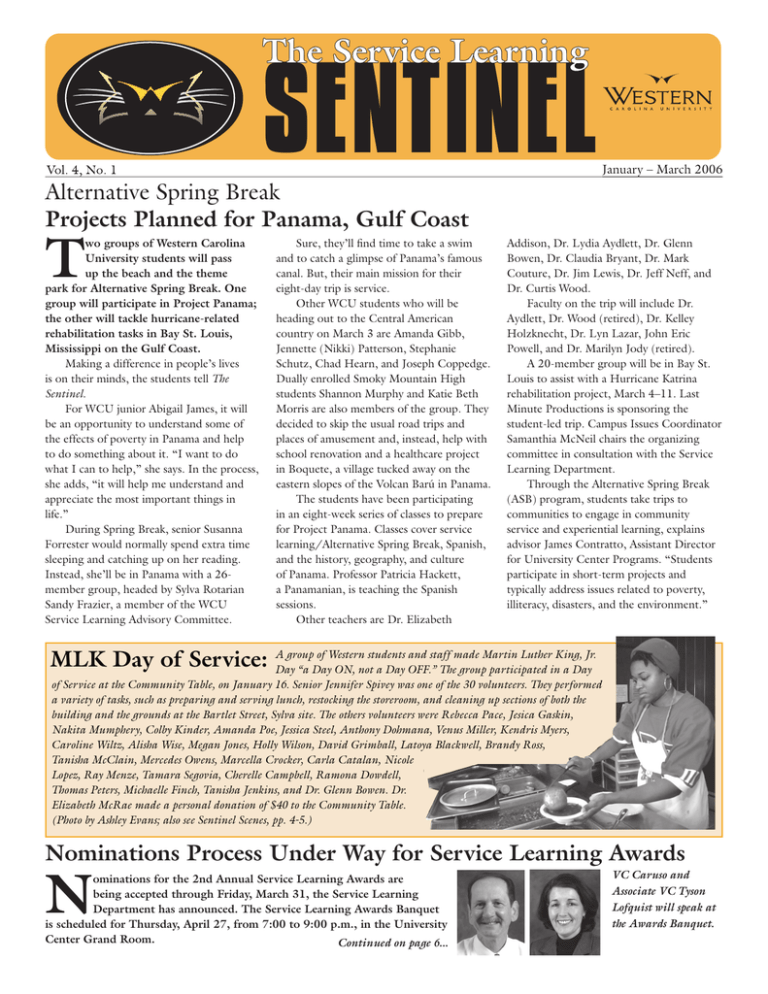
Vol. 4, No. 1 SENTINEL January – March 2006 Alternative Spring Break Projects Planned for Panama, Gulf Coast T wo groups of Western Carolina University students will pass up the beach and the theme park for Alternative Spring Break. One group will participate in Project Panama; the other will tackle hurricane-related rehabilitation tasks in Bay St. Louis, Mississippi on the Gulf Coast. Making a difference in people’s lives is on their minds, the students tell The Sentinel. For WCU junior Abigail James, it will be an opportunity to understand some of the effects of poverty in Panama and help to do something about it. “I want to do what I can to help,” she says. In the process, she adds, “it will help me understand and appreciate the most important things in life.” During Spring Break, senior Susanna Forrester would normally spend extra time sleeping and catching up on her reading. Instead, she’ll be in Panama with a 26member group, headed by Sylva Rotarian Sandy Frazier, a member of the WCU Service Learning Advisory Committee. Sure, they’ll find time to take a swim and to catch a glimpse of Panama’s famous canal. But, their main mission for their eight-day trip is service. Other WCU students who will be heading out to the Central American country on March 3 are Amanda Gibb, Jennette (Nikki) Patterson, Stephanie Schutz, Chad Hearn, and Joseph Coppedge. Dually enrolled Smoky Mountain High students Shannon Murphy and Katie Beth Morris are also members of the group. They decided to skip the usual road trips and places of amusement and, instead, help with school renovation and a healthcare project in Boquete, a village tucked away on the eastern slopes of the Volcan Barú in Panama. The students have been participating in an eight-week series of classes to prepare for Project Panama. Classes cover service learning/Alternative Spring Break, Spanish, and the history, geography, and culture of Panama. Professor Patricia Hackett, a Panamanian, is teaching the Spanish sessions. Other teachers are Dr. Elizabeth Addison, Dr. Lydia Aydlett, Dr. Glenn Bowen, Dr. Claudia Bryant, Dr. Mark Couture, Dr. Jim Lewis, Dr. Jeff Neff, and Dr. Curtis Wood. Faculty on the trip will include Dr. Aydlett, Dr. Wood (retired), Dr. Kelley Holzknecht, Dr. Lyn Lazar, John Eric Powell, and Dr. Marilyn Jody (retired). A 20-member group will be in Bay St. Louis to assist with a Hurricane Katrina rehabilitation project, March 4–11. Last Minute Productions is sponsoring the student-led trip. Campus Issues Coordinator Samanthia McNeil chairs the organizing committee in consultation with the Service Learning Department. Through the Alternative Spring Break (ASB) program, students take trips to communities to engage in community service and experiential learning, explains advisor James Contratto, Assistant Director for University Center Programs. “Students participate in short-term projects and typically address issues related to poverty, illiteracy, disasters, and the environment.” MLK Day of Service: A group of Western students and staff made Martin Luther King, Jr. Day “a Day ON, not a Day OFF.” The group participated in a Day of Service at the Community Table, on January 16. Senior Jennifer Spivey was one of the 30 volunteers. They performed a variety of tasks, such as preparing and serving lunch, restocking the storeroom, and cleaning up sections of both the building and the grounds at the Bartlet Street, Sylva site. The others volunteers were Rebecca Pace, Jesica Gaskin, Nakita Mumphery, Colby Kinder, Amanda Poe, Jessica Steel, Anthony Dohmana, Venus Miller, Kendris Myers, Caroline Wiltz, Alisha Wise, Megan Jones, Holly Wilson, David Grimball, Latoya Blackwell, Brandy Ross, Tanisha McClain, Mercedes Owens, Marcella Crocker, Carla Catalan, Nicole Lopez, Ray Menze, Tamara Segovia, Cherelle Campbell, Ramona Dowdell, Thomas Peters, Michaelle Finch, Tanisha Jenkins, and Dr. Glenn Bowen. Dr. Elizabeth McRae made a personal donation of $40 to the Community Table. (Photo by Ashley Evans; also see Sentinel Scenes, pp. 4-5.) Nominations Process Under Way for Service Learning Awards N ominations for the 2nd Annual Service Learning Awards are being accepted through Friday, March 31, the Service Learning Department has announced. The Service Learning Awards Banquet is scheduled for Thursday, April 27, from 7:00 to 9:00 p.m., in the University Center Grand Room. Continued on page 6... VC Caruso and Associate VC Tyson Lofquist will speak at the Awards Banquet. What they’re saying ... • This is the kind of thing universities should be doing; it’s not an “ivory tower kind of thing.” It’s real and it’s good. • Having little marketing experience, the ideas generated have helped me reassess marketing strategies already in place. ... Also, Website strategy and representation was useful. • Great job by both student and teacher; great work and very thoughtful project! – Community Partners in Bruce Berger’s Business Law (BA 693) course in the Fall 2005 semester. This course, which Prof. Berger designed and implemented, involvees Small Business and Technology Development Center (SBTDC) clients along with A-B Tech Small Business Incubator clients. The clients are assigned to MBA and MACC students who provide consulting/problem-solving services under Prof. Berger’s guidance. Problem-Based Service Learning Problem-Based Service Learning (PBSL) is an approach to service learning embraced by higher education faculty in the United States. PBSL engages students working in teams to seek solutions to real, community-based problems. Students are expected to use their knowledge and skills to formulate and propose authentic, viable solutions to problems that reflect genuine community needs. A recent PBSL publication (sponsored by Campus Compact for New Hampshire) includes an outline of eight facets of PBSL: project design, community partner relations, community building, capacity building, problem statement, project management, assessment, and reflection and transfer. Taken together, these facets reflect a coherent approach to problem solving at the community level with the assistance of college and university students. As students engage in course-based community service (service learning) of this kind, they enrich their learning experiences and help to improve local communities. Faculty at Western should make the benefits of PBSL available to their students. The Sentinel is published quarterly by the Service Learning Department, Division of Student Affairs, Western Carolina University. Glenn Bowen Director of Service Learning Jane Adams-Dunford Assistant Vice Chancellor for Student Affairs 460 H.F. Robinson Administration Building Cullowhee, NC 28723 Telephone: 828-227-7234 Fax: 828-227-7036 http://www.wcu.edu/studentd/service_learning 2 The Seninel, January – March 2006 • From this experience [at Mountain Trace Nursing Center], I have decided to change my major. I have learned that I can be interactive with patients without all of the blood and gore. • I was glad to help out with the after school program [at Cullowhee Valley Elementary School]. There were a lot more kids than adults and I know being there made a difference. • My service experience [at REACH Thrift Store] was a positive experience because I got to help unfortunate people and it made me happy to see that they were happy. – Students in Dr. Ronda Bryant’s USI 130 (University Experience) class in the Fall 2005 semester. • I was really impressed with this class. ... I was also grateful for the community service project that the class required. It was a project that I was not looking forward to until I actually went out and participated in the “Make a Difference Day” [project at Fairview School, Sylva]. This project really let me get in touch with not only my school ... but [also with] the community outside of campus, the real world in which I will have to participate one day. – Luke Riggins Riggins,, freshman in Dr. Glenn Bowen’s USI 130 class • It was good to be a part of; made me feel good about myself. • I enjoyed doing something for MDCS. – Students in CIS 493-70 (Hardware Installation & Maintenance), taught by Prof. Ronnie Stillwell, Stillwell, assisted by Dr. Paul Jacques. The service-learning project site was Mountain Discovery Charter School (MDCS), Bryson City. Volunteers can make a real difference Anna Mathis S Perspective tudents can make a difference by volunteering. That’s something I learned while I was a student at Western Carolina University. I am a 2002 graduate of Western and I am now employed by the Jackson County Family Resource Center as the Director of Programming. There are not many local students who go to college and expect to find their “dream job” here in Jackson County. Let’s face it: there just aren’t many opportunities in Jackson County to become a nurse, physical therapist, accountant, PR agent, or other professional and make the money that you could make in a large city. However, if you have lived here long enough, you learn to appreciate Jackson County for being so small. We are a close community that cares about one another and what happens in our town. Jackson County Family Resource Center (FRC), which is located in the back of Webster Daycare. The FRC is a non-profit organization that provides many services free of charge for the community and surrounding areas. With most of their programs, the FRC provides a free light evening meal and childcare. I volunteered my childcare services at the FRC in the evening after working at the daycare. Most programs last two hours at the FRC, so I had no problem volunteering for two more hours. I worked at the daycare for most of my high school and college years until I was laid off due to state budget cuts. I was somewhat sad but also excited to try another job. I got a non-work study job at WCU in a computer lab. I loved this job but missed my children at the daycare. I was majoring in public relations, because although I love children, I “Nothing makes me happier than knowing that I help residents in Jackson and surrounding counties. I care about what happens in my community ...” I wish I could say I am a native of Jackson County; however, I was born on the East Coast of North Carolina and moved here in the summer between 8th and 9th grade. It was the hardest transition I have ever made. I moved here with my mother and stepfather and left all my family and friends behind. I didn’t know anyone in Sylva and I didn’t want to. As my 9th grade school year went by, I made several new friends and had a job at a local grocery store. I was coping better with the change and enjoying life in high school – better than I expected. I soon changed jobs and became employed at Webster Daycare. I had always loved working with children and had volunteered in several childcare centers since I was around 10 years old. I had no idea that working in this center would help me so much in the future. I worked for Southwestern Child Development for five years. During this time, I filled in at various centers, performed clerical duties and volunteered often at the didn’t want to work with them as my career. Also, I minored in English because I love to write. I worked in the computer lab for the rest of my college term, which was a year. Reality of Life I graduated from Western Carolina University in December of 2002 with a B.A. in Public Relations. I wasn’t quite ready to jump into a job, but that’s the reality of life. It was time for me to make it own my own. I started doing mass mailings all over Jackson and the surrounding counties, looking for my first “real” job. It got a little discouraging, but I never gave up. Only three months from graduating, the FRC had an ad in the paper for the position of Director of Programming. I met all of the qualifications, so I sent in my application. In my interview, I explained that I had volunteered at the center several times and knew a lot about the organization. The same day I interviewed, I received a phone call telling me that the position at the Family Resource Center was mine. I was so excited! Strong Commitment T he Jackson County Family Resource Center has a strong commitment to the families in our area. FRC’s primary focus is on supporting and enhancing the presence of healthy children and strong families in a caring community while fostering personal development. All programs sponsored by the FRC support its mission to provide a warm, welcoming environment where community and family members may have access and find information about all types of services available to families and individuals. The center offers many exciting programs, including parenting classes; respite care for children, disabled adults and seniors; and GED classes as well as adult basic education. Computers are provided on site for public use. I love my job, and I especially love that I could stay in my community to work with the people I care so much about. Nothing makes me happier than knowing that I help residents in Jackson and surrounding counties. I care about what happens in my community. Making a change for the better in the lives of our community members is what brings me joy and makes me work hard at what I do. It is important to get out in the community and volunteer. Students should get their name and face out there by volunteering in a program or field in which they are interested. Volunteers are needed in every community. By volunteering, students can make a real difference in their future, and in the future of our community. Anna Mathis may be contacted at the Jackson County Family Resource Center, 828-586-2845, or mathis.anna@swcdcinc.org. The Sentinel Sentinel, January – March 2006 3 Sentinel Scenes 4 The Seninel, January – March 2006 . . . ON MARTIN LUTHER KING DAY 2006 Photos: Office of Public Relations and Office of Multicultural Affairs Design: Clint Hardin The Sentinel Sentinel, January – March 2006 5 Service Learning Award Nominations ...Continued from page 1 The award categories include Community Service (Individual and Organization); Peer Education; Meritorious Service; Outstanding Achievement (Students and Faculty – Teaching, Research, and Service); and Partnership. The Leading Light Award will go to an academic department in recognition of significant integration of service learning into its curricula and courses. John Barnhill, Executive Director of North Carolina Campus Compact, will be the guest speaker at the banquet. Other speakers will include Sylva’s Mayor Brenda Oliver; Dr. Robert Caruso, Vice Chancellor for Student Affairs, and Dr. Beth Tyson Lofquist, Associate Vice Chancellor for Academic Affairs. Approximately 50 awards were presented at the inaugural Service Learning Awards Ceremony last year. These included 17 major awards (plaques) in nine categories. Certificates and pins were presented as well. In Our Library From time to time, we will publish information on books and journal articles in the Service Learning Department. In this issue, we focus on some Campus Compact publications. Titles include Civic Engagement Across the Curriculum, Fundamentals of Service-Learning Course Construction, The Journal of Public Affairs, Introduction to ServiceLearning Toolkit, Assessing Service Learning and Civic Engagement, The Promise of Partnerships, Service Learning in Engineering, The New Student Politics, and Up and Running.– Editor Certificates and Pins Adjunct Professor Michael Caudill (Communication, Theatre & Dance) received a certificate in recognition of his achievement in teaching. His Crisis Communication course included a servicelearning component. For exemplary participation in a service-learning project, 10 students who took Dr. James H. Murphy’s Introductory MicroEconomics course received certificates and pins. They are Casey Black, Megan Chamblee, Beth Kenyon, Drew Lancaster, Jessica Lodding, Jared Mabry, Pamela Mulwee, Judy Nguyen, Nick Rulon, and Meredith Silas. Students in Dr. Christopher Cooper’s Civic Engagement class were similarly recognized. Clare Sabo, Clyde Ray, Crystal Belch, Darius Foster, Eric Reid, Mike Blackmon, Roxana Jimenez, and Todd Herms comprised the class. Certificates and pins were presented also to campus and local community volunteers Erin Bradley, Megan Hazelrigg, Jesica Gaskin, Candace Brooke Humphries, Taleka Reid, Christina Spatharos, Lee Ann Crook, Shaun Arrington, Heather Honeycutt, Lauren Riggan, Kathryn Dronzek, and Joe Alexander. Alpha Phi Alpha and the Athletic Training Club were recognized for their community service projects. Community partners who received certificates included Seth Cole (Big Brothers Big Sisters of Jackson & Haywood Counties), Emma Miller (Region A Partnership for Children), Donna Ayers (Head Nurse for Labor and Delivery at Harris Regional Hospital), Joyce Carnes (Birth Registrar, Harris Regional Hospital), Community Table, REACH of Jackson County, Sandy Frazier (REACH of Jackson County), Norma McClure (REACH Thrift Store), Mountain Trace Nursing Center, and Eddie Wells (Cullowhee Valley After-School Program). 6 The Seninel, January – March 2006 Summer Institute to Include Service Learning S ervice Learning will be a Focus Team topic for the 4th Annual Summer Institute for Teaching and Learning, May 15-18, the Faculty Center has announced. “This is a strong indication of faculty interest in service learning,” says Dr. John Habel, Chairman of the Faculty Center Advisory Board. Eight other Focus Team topics will be on the program. Dr. Donna Llewellyn, Director of the Center for the Enhancement of Teaching and Learning at Georgia Tech., will be the guest facilitator. The registration period is February 13–March 3 (or until available places are filled), and the Institute will be held in the A. K. Hinds University Center. There were 57 faculty participants at the last year’s Summer Institute. Students Participating in AmeriCorps Program MEDFORD SCHOLARSHIP APPLICATIONS DUE MARCH 20 Kathleen Cummins, Amber Poling, and Heather Weaver are setting the pace among WCU participants in the NC-ACTS! AmeriCorps program. (NC-ACTS is the acronym for North Carolina – Activating Citizenship Through Service.) Cummins, a sophomore, is completing most of her service requirements at the Mountain Trace Nursing Center, a 106-bed long-term care nursing facility located in Webster. A nursing major, she also does volunteer work at Harris Regional Hospital in Sylva. Amber Poling, a junior, volunteers at REACH of Jackson County in Sylva. “I chose this organization because I am a social work major and this organization can help me build skills I will need in my career,” she adds. “I love the idea of this organization because it helps people who are victims of domestic violence and abuse.” Cummings and Poling are among 10 students at Western to whom NCACTS slots have been offered this academic year. Created in 1993 as part of the Corporation for National and Community Service, AmeriCorps is a network of national service programs that engage more than 50,000 Americans each year in meeting needs in education, public safety, health, the environment, and recently homeland security. Eligible students from member campuses of North Carolina Campus Compact are required to complete 300 hours of service during one academic year. They will receive an educational award of $1,000. North Carolina Campus Compact is a coalition of college and university presidents (chancellors) established to increase campus-wide participation in community and public service and to integrate community service as a valued component of undergraduate education. Goals of the NC-ACTS! AmeriCorps program are to foster civic engagement among higher education students, promote the national service movement, and encourage positive relationships between campuses and communities. ADVISORY COMMITTEE: Russ Harris has replaced Maggie Donahue on the Service Learning Advisory Committee. Both Harris and Donahue are Outreach Counselors with Educational Talent Search. The Service Learning Department participates in the Talent Search summer program. ROTARY SPEAKER: Glenn Bowen, Director of Service Learning, was guest speaker recently at a luncheon meeting of the Rotary Club of Sylva. Rotarian Bill Haggard, Associate Vice Chancellor for Student Affairs, introduced the speaker. Jane Adams-Dunford, Assistant Vice Chancellor for Student Affairs, was a guest at the meeting. Western, the Rotary Club, the Interact Club of Smoky Mountain High School, and St. David’s Episcopal Church are among partners in “Project Panama,” an international Alternative Spring Break project. Glenn Bowen also participated in a panel discussion on “Service Learning and Internship Opportunities in Western North Carolina” at the Western Regional Meeting of Health Educators on January 27 on Asheville-Buncombe Technical Community College’s Enka Campus, near Asheville. Other panelists included representatives of Appalachian State University and UNC Asheville. Health educator Jimmi Buell, a member of the WCU Service Learning Advisory Committee, attended the meeting. The Jacob Spencer Medford Service Learning Scholarship application deadline is March 20. Five $1,000 scholarships are available for the 20062007 academic year. Scholarship recipients – “Medford Scholars” – benefit from an endowed fund established in 2003 by the family of Jacob Spencer (“Jake”) Medford, of Marion, NC – a Western Carolina University student who was killed in an automobile accident in 2002. The scholarships are awarded annually through a competitive process to deserving students who have demonstrated a commitment to community service and academic achievement. Coordinated by the Office of Student Affairs, the scholarship application process begins in January, and the announcement of recipients is made at the annual Service Learning Awards on the last Thursday of April. Medford Scholars serve primarily as Peer Educators in the Service Learning Program. Service learning is a teaching-and-learning approach that combines community service with academic instruction, focusing on critical, reflective thinking and civic responsibility. Students participate in organized activities that address community needs and enrich learning. Application forms and information are available in the Office of Student Affairs, 460 H. F. Robinson Administration Building, and at the Service Learning Web site, http://www.wcu.edu/studentd/service_ learning/. JOURNAL ARTICAL: A paper by F. Brad Wardlaw, former Assistant Professor, and Rey Treviño, Assistant Professor of Health and Human Performance, entitled “Service Learning in Therapeutic Recreation,” will be published in Expanding Horizons in Therapeutic Recreation (Vol. XXII) in March 2006. They presented the paper at the 34th Midwest Symposium on Therapeutic Recreation and Adapted Physical Activity in Springfield, IL, last year. DISPLAY: Various Service Learning Department publications were on display in the Hunter Library in January. The publications – articles, newsletter, faculty resource guide, and booklet – were included in the month-long WCU Faculty & Staff Exhibition. MLK DAY RECEPTION: The Martin Luther King, Jr. Day of Service culminated with a reception in the University Center Grand Room. Volunteers reflected on the day’s activities and their significance in relation to the Rev. Dr. King’s life and legacy. The Student Government Association (SGA) sponsored the reception, which was organized by the Martin Luther King, Jr. Celebration Planning Committee in association with the Service Learning Department. SGA President Cody Grasty attended the reception. The Sentinel Sentinel, January – March 2006 7 Inaugural Community Service Fair Held in UC W estern’s inaugural Community Service Learning Fair was held on February 24 in the A. K. University Center. The UC Grand Room was a beehive of activity as more than 30 community agencies from across the Western North Carolina region showcased their programs and services and engaged in discussions with students and other campus partners. More than 30 community agencies, including the Haywood County Volunteer Center/ Retired and Senior Volunteer Program (RSVP), participated in the Fair. A highlight of the day’s activities was a luncheon in Club Illusions. The luncheon speaker was Ann Von Brock, Board Member of the Charlotte-based NC Center for Nonprofits and Vice President, Planning and Community Investment, for United Way of Asheville and Buncombe County. Ms. Von Brock, who has worked in nonprofits since 1976, spoke about “the vital role” being played by these Internal Revenue Service (IRS)-designated 501(c)(3) “private corporations that exist to serve the public interest.” Approximately 850 of the 2,000 nonprofit organizations in the Western NC region generate $1.95 billion in Promoting Significant Student Learning and Civic Engagement: Principles, Procedures, and Practices Mark Your Calendars! Thursday, June 8, 2006 9:00 a.m. – 4:00 p.m. Lead Presenter: Dr. Robert G. Bringle Nationally recognized scholar and author Director, Center for Service and Learning, Indiana University–Purdue University Indianapolis (IUPUI) Recipient of the 1998 Thomas Ehrlich Faculty Award for Service Learning Session Proposals due March 10 For further information, please visit the Web site http://www.wcu.edu/studentd/service_learning/symposium/ or contact Glenn Bowen, Ph. D., Director of Service Learning Western Carolina University Cullowhee, NC 28723 Phone: 828-227-7234; Fax: 828-227-7036 gbowen@email.wcu.edu 8 The Seninel, January – March 2006 annual revenues – 75 percent from fees for services, 20 percent from contributions, and 8 percent from government. According to Ms. Von Brock, the nonprofits spend $1.8 billion a year, which helps the local economy, creates social Ann Von Brock (left) was the luncheon speaker at the Community Service capital, and improves Learning Fair. Jane Adams-Dunford the quality of life. However, Ms. Von welcomed luncheon guests. Brock pointed out, nonprofits currently face fiscal challenges as well as challenges related to competition, technology, and organizational effectiveness. These corporations are “now more under scrutiny” and need to be well run and well managed. The NC Center for Nonprofits is working to improve the efficiency and effectiveness of the nonprofit sector, she said. There are “tremendous opportunities for students” in such areas as marketing, language, and technology. “We need their skills; we need new ideas and perspectives from young people,” the speaker added. Jane Adams-Dunford, Assistant Vice Chancellor for Student Affairs, welcomed community agencies and other guests at the luncheon. She spoke about the strong partnerships being forged between the university and the external community, especially in relation to service learning and civic engagement initiatives. Quoting author/lecturer Marianne Williamson, the Assistant VC said: “In every community, there is work to be done; in every nation, there are wounds to heal; in every heart, there is the power to do it.” Service Learning Fellow Vera Guise coordinated the Fair. Director Glenn Bowen announced that it would become an annual event. Students to Lead Session at COOL Conference F our students from Western will lead a session at the 22nd Annual C.O.O.L. Idealist National Conference, March 3-5, in Nashville, TN. Mark McConnell, Raymond Olive, Ashley Roberts, and Dawn Treneman – all sophomores in the Interior Design program – will present a workshop on “Grass Roots: Sustainability Begins at Home.” “We had an outstanding array of workshop proposals submitted this year, so the selection process was quite competitive,” stated Heather Cronk, Conference Program Coordinator. “We’re thrilled that your workshop will be part of the program,” she told the student group. The students will ride the COOL Bus with other conference participants from Asheville to Nashville. Service Learning Fellow Jane Nichols (College of Applied Sciences/Interior Design Program) will present a poster session at the conference.
